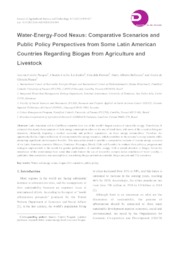Water-energy-food nexus: comparative scenarios and public policy perspectives from some Latin American countries regarding biogas from agriculture and livestock.
Water-energy-food nexus: comparative scenarios and public policy perspectives from some Latin American countries regarding biogas from agriculture and livestock.
Author(s): PASQUAL, J. C.; LARDIZABAL, C. C.; HERRERA, G.; BOLLMANN, H. A.; NUNES, E. de O.
Summary: Latin American and the Caribbean countries have one of the world?s largest sources of renewable energy. Nonetheless, it estimated that nearly three-quarters of their energy consumption relies on the use of fossil fuels, with most of the countries being net importers, ultimately imposing a marked economic and political dependence on those energy commodities. Therefore, the opportunity lies in a higher utilization of various renewable energy resources, which contribute to the country?s energy security while promoting significant environmental benefits. This manuscript aimed to provide a comparative analysis of current energy scenarios of six Latin American countries (Mexico, Honduras, Nicaragua, Brazil, Chile and Ecuador) to evaluate their policies, programs and strategies implemented in the search for greater participation of renewable energy, with a special attention to biogas. Given the importance of the water-energy-food nexus that could foment the use of renewable energies under conditions of water scarcity, a qualitative data comparison was accomplished, considering biogas production potential, biogas projects and CO2 emissions.
Publication year: 2015
Types of publication: Journal article
Unit: Embrapa Soybean
Keywords: Biogás
Observation
Some of Embrapa's publications are published as ePub files. To read them, use or download one of the following free software options to your computer or mobile device. Android: Google Play Books; IOS: iBooks; Windows and Linux: Calibre.
Access other publications
Access the Agricultural Research Database (BDPA) to consult Embrapa's full library collection and records.
Visit Embrapa Bookstore to purchase books and other publications sold by Embrapa.

